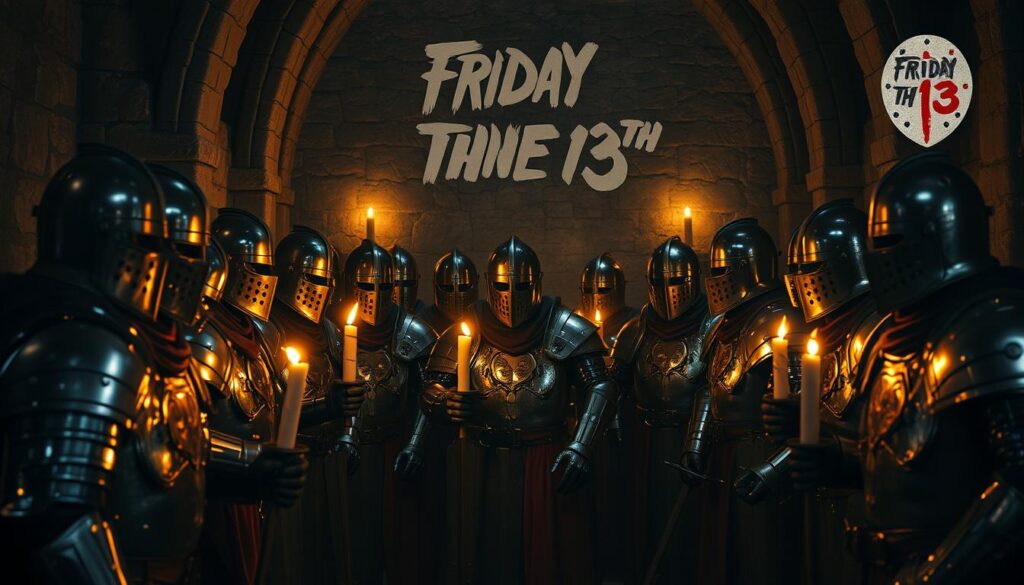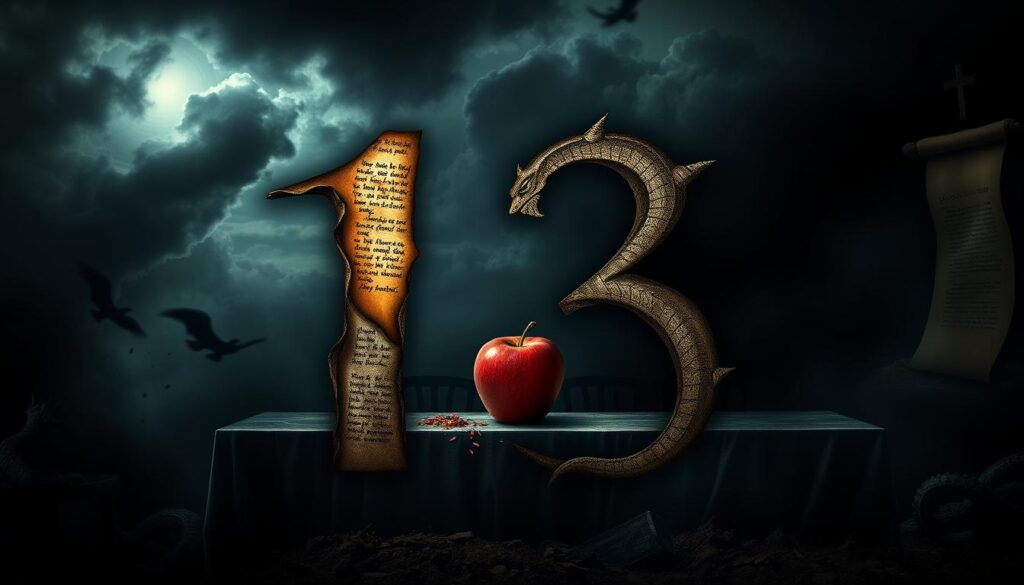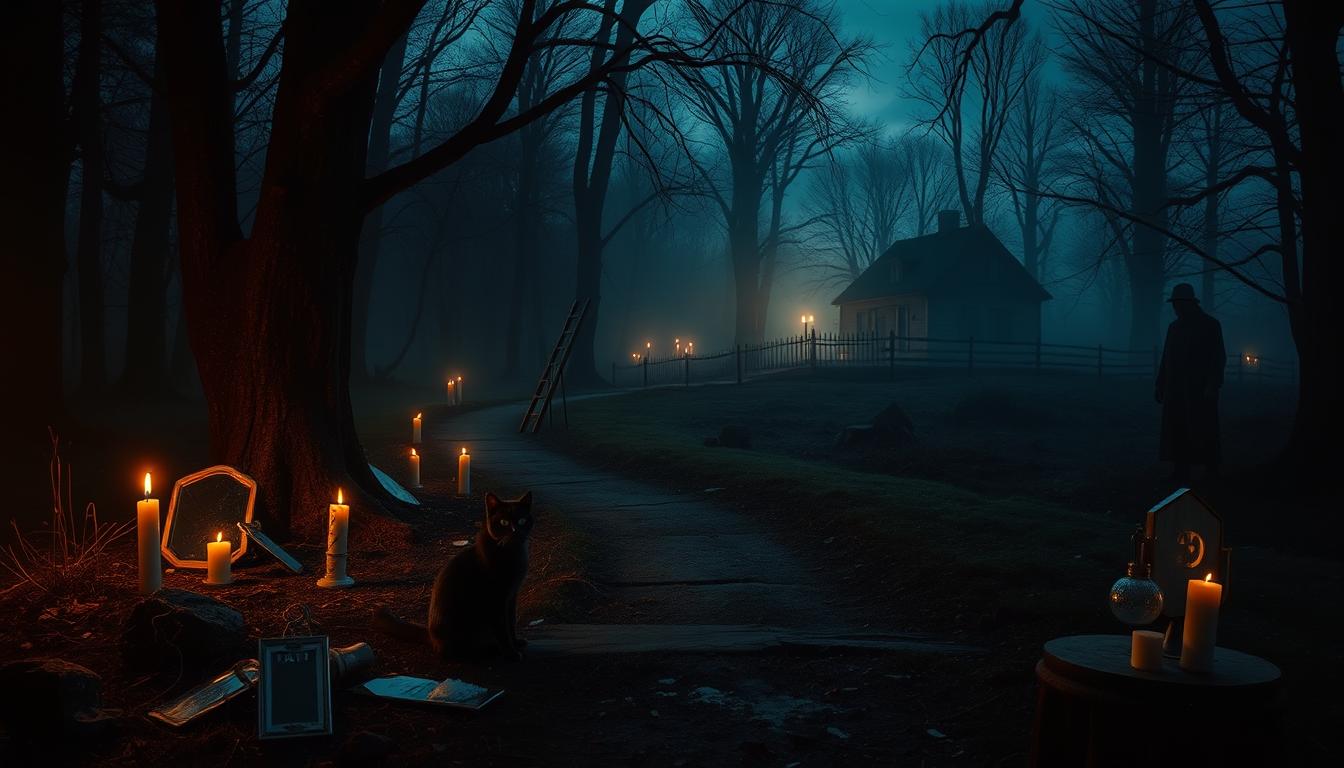When you hear “Friday the 13th,” you might feel a shiver of fear. This superstition has been around for centuries in Western culture. It’s seen as a day of bad luck. But what’s behind this fear, and where did it start?
The fear of Friday the 13th is called paraskevidekatriaphobia, a type of triskaidekaphobia, or fear of the number 13. Many think this date is unlucky, but it’s actually a bit more likely to be a Friday because of the calendar.
The reasons for this superstition are many and varied. In some places, like Greece and Spanish-speaking countries, Tuesday the 13th is the unlucky day. In Italy, it’s Friday the 17th. But the idea that certain days are unlucky stays with many people.
Key Takeaways
- The fear of Friday the 13th, known as paraskevidekatriaphobia, is a deeply ingrained superstition in Western culture.
- The notion of this date as an unlucky day has evolved over time and varies across different cultures and regions.
- Despite its prevalence, the Gregorian calendar actually makes the 13th of any month slightly more likely to fall on a Friday than any other day of the week.
- The origins of this superstition are complex, with various historical events and cultural beliefs contributing to the persistent belief in the power of “ominous” days.
- The fear of Friday the 13th has had a significant impact on business and everyday activities, with some individuals going to great lengths to avoid the date.
The Fear of 13
In many Western cultures, the number 13 is seen as unlucky. This fear, called triskaidekaphobia, comes from old traditions. For centuries, people have seen 13 as a bad sign.
Historical Associations with Number 13
The number 12 is often a symbol of fullness. But 13 comes after it, making it seem unlucky. The Code of Hammurabi didn’t have a 13th law, adding to its bad reputation. Biblical stories, like the Last Supper with 13 people, also link 13 to betrayal.
Triskaidekaphobia: The Fear of Number 13
Triskaidekaphobia is the fear of the number 13. It’s a common phobia, affecting 17 to 21 million people in the U.S. The fear of Friday the 13th is also widespread.
Why people fear 13 so much is still a mystery. It’s interesting to explore the roots of this fear.
“Around $800 to $900 million in business is lost in the U.S. on Friday the 13th due to people avoiding travel and conducting normal business activities.”
Why is Friday the 13th Unlucky?
The superstition about Friday the 13th comes from Christian tradition. The Last Supper, with Jesus and his 12 apostles, including Judas, is key. Judas betrayed Jesus, leading to Jesus’ death the next day, Good Friday.
This event led to a belief that having 13 at a table was bad luck, even death. Friday itself is seen as unlucky because of Eve and Adam’s story and Cain killing Abel.
The Biblical Roots of the Superstition
The number thirteen superstition started with the Last Supper and Judas Iscariot. People believed that dining with 13 would lead to death within the year. To avoid this, they used precautions like equal seating or separate tables.
By the late 19th century, avoiding the number thirteen was common in hotels, desks, and cars. Hotels and inns avoided room 13, and buildings skipped the 13th floor.
“In France, it is considered unlucky to have a dinner for 13 people, leading to the hiring of a professional 14th guest called a ‘quatorzieme.'”
Friday the 13th being seen as unlucky is a 20th-century idea. The first newspaper mentions of it were in 1908, in The New York Times and Los Angeles Times.
Friday the 13th’s superstition affects businesses and people a lot. It’s said that businesses lose millions because of it. This is due to less consumer activity in deals, travel, and shopping.
The Thirteen Club
In the late 19th century, a group of forward-thinking New Yorkers wanted to fight the stigma around the number 13. They were led by Captain William Fowler and started the Thirteen Club. Their goal was to break the superstitions about this number.
The club’s first meeting was on Friday the 13th at 8:13 PM in room 13 of the Knickerbocker Cottage. They met on the 13th day of each month, eating under a ladder and a banner that said “Morituri te Salutamus” – “Those of us who are about to die salute you.” This act was a bold move against the belief that 13 was unlucky and Friday the 13th a bad day.
The club grew fast, from 13 members in 1882 to 100 times 13 by 1889. Four former U.S. presidents – Chester A. Arthur, Grover Cleveland, Benjamin Harrison, and Theodore Roosevelt – joined, making the club more respected.
The Thirteen Club did more than just have dinners. They worked to clear up superstitions about the number 13 and Friday the 13th. They even convinced local officials to change the day of executions from Fridays. The club’s archivist helped prove that Friday wasn’t an unlucky day, and they celebrated when Friday was the 13th of the month.
Thanks to their efforts, the Thirteen Club changed how people saw the number 13 and Friday the 13th. They showed the power of challenging old beliefs with facts. Their story teaches us to question superstitions and seek truth.
Why Friday the 13th Spelled Doom for the Knights Templar
The Knights Templar, a powerful group in the 12th century, faced disaster on Friday, October 13, 1307. On this day, King Philip IV of France arrested hundreds of Templars. They were accused of things like blasphemy and sodomy.
The king’s real reasons were darker. He wanted the Templars’ wealth for himself. This event marked the start of their downfall and end.
After the initial arrests, over 600 Templars were taken into custody. By 1310, more than 50 were burned alive. They spent two years in prison before some were executed. The Grand Master, Molay, and others were burned in Paris in 1314.
Many think the Knights Templar and Friday the 13th link is just a myth. But the events of 1307 did start the superstition around this date. It linked the Templars’ sad story with the unlucky day.
| Year | Event |
|---|---|
| 1118 | The Knights Templar Order was founded |
| 1307 | Hundreds of Templars were arrested on Friday, October 13 |
| 1310 | More than 50 Templars were burned at the stake |
| 1314 | Grand Master Molay and other Templars were burned at the stake in Paris |
The Knights Templar’s fall, especially on Friday, October 13, 1307, is tied to the Friday the 13th superstition. The debate is ongoing, but their tragic end has made the date famous.

Friday the 13th in Pop Culture
The legend of Friday the 13th has deeply influenced popular culture. In 1907, the novel “Friday, the Thirteenth” by Thomas William Lawson was published. It tells of a stockbroker in New York who uses superstitions about the date to cause chaos on Wall Street.
The horror movie franchise, starting in 1980, made Friday the 13th a pop culture icon. It introduced Jason Voorhees, a killer in a hockey mask. This character has become a horror icon. The franchise has grown to include movies, comics, video games, and Halloween costumes.
“The Friday the 13th franchise has become a cultural phenomenon, with Jason Voorhees’ iconic hockey mask being recognized worldwide as a symbol of the superstition’s enduring presence in popular culture.”
The “Friday the 13th” Horror Franchise
The first Friday the 13th movie in 1980 was a hit, starting a successful horror franchise. Over 30 years, 12 movies followed, each with Jason Voorhees as the killer. These films are closely tied to the Friday the 13th superstition.
The Friday the 13th franchise has greatly influenced popular culture. It has inspired many other movies, TV shows, and video games. Jason Voorhees is now a symbol of horror and the Friday the 13th superstition.
What Bad Things Happened on Friday 13th?
The superstition around Friday the 13th is deep and rooted in history. Many traumatic events and misfortunes have happened on this date. From natural disasters to tragic accidents and criminal acts, Friday the 13th is seen as a day of bad luck.
The German bombing of Buckingham Palace on September 13, 1940, was a major event during World War II. It was a big hit to British morale. The murder of Kitty Genovese in Queens, New York, on March 13, 1964, made people talk about the bystander effect.
Natural disasters have also hit on this unlucky day. For example, a cyclone in Bangladesh on November 13, 1970, killed over 300,000 people. The disappearance of a Chilean Air Force plane in the Andes on October 13, 1972, had a big impact on the country and the families of those on board.
In the entertainment world, the death of rapper Tupac Shakur on September 13, 1996, was a big loss. The Costa Concordia cruise ship disaster off Italy on January 13, 2012, killed 30 people and was a global news story.
These events remind us of the lasting effect of the Friday the 13th superstition. It has deeply influenced popular culture and society.
Origins of the Superstition
The Friday the 13th superstition comes from Norse mythology. Loki, the mischievous god, crashed a banquet in Valhalla, making 13 gods there. Loki tricked the blind god Hodr into killing his brother Balder with a mistletoe arrow.
This story spread from Scandinavia to Europe, becoming popular by the Christian era. The link to Judas Iscariot, who betrayed Jesus, made the number 13 even more unlucky.
Norse Mythology and the Loki Myth
The Friday the 13th superstition started with Norse mythology and Loki, the god of mischief. Loki crashed a banquet, making 13 gods there. He tricked Hodr into killing his brother Balder with a mistletoe arrow.
This myth is thought to be why we see the number 13 as unlucky, especially on a Friday. The belief in the cursed Friday the 13th spread from Scandinavia to Europe, becoming part of many cultures.
“The origins of the Friday the 13th superstition can be traced back to Norse mythology, where the mischievous god Loki gate-crashed a banquet in Valhalla, bringing the number of gods in attendance to 13.”
Unlucky Fridays and Their Biblical Connections
Unlucky Fridays have deep roots in biblical tradition, even before Jesus’ crucifixion. The Bible links Friday to Adam and Eve eating the forbidden fruit, Cain killing Abel, the Temple’s fall, and Noah’s ark sailing. These events made Friday seem ominous, especially with the unlucky number 13.
In numerology, twelve is complete, but thirteen is seen as odd and breaking rules. Some say Friday the 13th started with the Last Supper, where thirteen at the table led to death. This fear, called paraskevidekatriaphobia, makes some avoid Friday the 13th, even skipping normal activities.
The superstition grew after the Knights Templar’s arrest on Friday, October 13, 1307. Today, many high-rise buildings skip the 13th floor, airports don’t have a 13th gate, and hotels and hospitals often lack a room 13. This is due to triskaidekaphobia, the fear of the number 13.
| Date | Event | Significance |
|---|---|---|
| Friday, the 13th | Adam and Eve ate the forbidden fruit | Marked the beginning of sin and misfortune in the world |
| Friday, the 13th | Cain murdered his brother Abel | The first recorded murder in the Bible |
| Friday, the 13th | The Temple of Solomon was toppled | The destruction of a holy site |
| Friday, the 13th | Noah’s ark set sail in the Great Flood | A day of catastrophic events |
Friday the 13th has been used to make money through books, movies, and music. The 2012 film was released on Friday, November 13, 2009, to tap into the superstition. But Christians see no reason to fear it, as God controls everything.

What is the meaning of Friday the 13th?
The superstition about Friday the 13th started in the Victorian era, not before. Before the 19th century, Friday the 13th wasn’t seen as unlucky. Thomas W. Lawson’s 1907 novel “Friday, the Thirteenth” changed that with its story of a broker who used superstitions to crash the stock market.
In the Victorian era, the idea that Friday the 13th was unlucky spread widely. This was a big change from before, when people didn’t worry much about this date. Today, the superstition shows how the Victorian era influenced our beliefs.
“One in four Americans say they are superstitious.”
Now, many people in the U.S., 17-21 million, fear Friday the 13th. This fear affects things like fewer weddings and travel plans. It shows how deep this superstition has become in our society.
But, some research says Friday the 13th might not be as unlucky as we think. For example, restaurants might see a 5% drop in sales on this day. Also, stock markets often see a 39% drop in returns on Friday the 13th. This shows how superstitions and market trends can affect our choices.
The Victorian Invention of the Superstition
The idea that Friday the 13th is unlucky comes from the Victorian era. Thomas W. Lawson’s novel “Friday, the Thirteenth” made this superstition popular. It changed how people saw this day.
The Positive Side of Fridays and Number 13
Friday the 13th is often seen as unlucky, but it has deep roots in pagan beliefs. It’s connected to the divine feminine. In pre-Christian times, Friday was linked to Frigg, the Queen of Asgard in Norse mythology. She was a powerful sky goddess, loved for her role in love, marriage, and motherhood.
She was also seen as weaving the fate of the world. This gave protection to homes and families.
The number 13 was important in pagan cultures, tied to the lunar and menstrual cycles. It symbolized the power and fertility of the feminine divine. The lunar calendar, with its 13 months, made 13 a sacred number.
Pagan Associations with Feminine Divine
For pagans and goddess worshippers, Friday the 13th was a day to honor the feminine divine. It was seen as a time to celebrate life, death, and rebirth. The 13th day marked a key point, halfway between the new moon and the full moon.
- The number 13 was linked to the average number of menstrual cycles a woman has yearly. It symbolized the power and fertility of the feminine divine.
- Women who followed the moon’s cycles would shed their uterine lining at the new moon and ovulate at the full moon. The 13th day was the midpoint of this cycle.
- The lunar calendar, with its 13 months, made the number 13 even more significant. It was seen as a symbol of feminine power and creativity.
Friday the 13th was not a day of bad luck for pagans. It was a time for rituals and celebrating the divine feminine. Instead of fearing it, they used its energy to boost creativity, emotional awareness, and gratitude for life.

“In pagan times, Friday the 13th was a day to honor the Goddess and feminine energy, fostering creativity, emotional awareness, and gratitude for life.”
Misogyny’s Role in Suppressing Female Deities
As Christianity spread in the Middle Ages, it clashed with the worship of female deities. Christian leaders worked hard to stop these pagan beliefs. They called the goddesses and their followers witches. Goddesses like Frigg, tied to Friday, and the number 13, were seen as threats to the Christian faith.
These figures were attacked because they stood for feminine power, love, fertility, and pleasure. The Christian church saw these as evil. This move helped the church keep its power over society.
“Bloch’s essay questions whether misogyny is about the portrayal of women or a specific discourse, and whether there is a masculine equivalent. It raises queries about authorial intention and the persuasive nature of misogynistic literature.”
The demonization of feminine divine shows a deep bias against women’s power. This bias affected not just spirituality but also culture and society. It led to the ongoing misogyny and suppression of female deities.
Lichtenstein looks at how beauty and femininity were linked in the 17th century. He sees beauty as tied to moral views on women’s sexuality. Fineman talks about how Shakespeare’s work shows a shift to a dislike of women.
Ferguson looks at how laws on rape in the 18th century viewed consent. She shows how laws affect how we see rape by looking at the victim’s will and mental state.
The suppression of female deities and the patriarchal demonization of the feminine divine have deeply affected our society. Knowing about this history helps us fight against the misogyny and suppression of female deities today.
Challenging the Narrative
In recent years, efforts have been made to change the negative views on Friday the 13th and the number 13. Taylor Swift, a famous singer-songwriter, has embraced 13 as her lucky number. She talks about how the number 13 has brought her good luck, like being born on the 13th and her first album going gold in 13 weeks.
By celebrating 13 as her lucky charm, Swift is changing the way people see this date and number. This is part of a bigger effort to change the friday the 13th narrative and reframe the superstition around the number 13.
Taylor Swift’s Embrace of 13 as a Lucky Number
Swift really likes the number 13. She even writes it on her hand before shows, saying it brings her luck. In interviews, she shares stories of how 13 has been good to her in her life and career.
- Swift was born on December 13th.
- Her first album was released 13 weeks after her debut, and it went gold.
- She often performs wearing the number 13 written on her hand.
- Swift’s lucky number 13 has become a big part of her brand.
Taylor Swift embracing 13 as a lucky number is helping to challenge the friday the 13th narrative. She’s also encouraging others to reframe the superstition around this number.

Conclusion
Friday the 13th has a long history, from ancient times to today. It has roots in old religions and has become a part of modern pop culture. Many still fear this date, but understanding its history could change how we see it.
The number 13 was once seen as lucky in some old religions. Now, Wiccans and pagans see Friday the 13th as a lucky and spiritual day. This shift shows how our views on this date can change.
By looking at the true origins of the superstition, we can see its misogynistic roots. Embracing the positive aspects of Fridays and the number 13 helps us see this day in a new light. This can lead to a better understanding of this cultural phenomenon.
Whether you believe in the superstition or not, Friday the 13th captures our imagination. It shows how stories and cultural beliefs shape our views and experiences. By diving into the story of this date, we can appreciate the mix of history, mythology, and human nature.
FAQ
What is the meaning of Friday the 13th?
Friday the 13th is a superstition in Western culture. It’s believed to be a day of bad luck. People fear this date a lot, which is called paraskevidekatriaphobia.
Why is the number 13 considered unlucky?
The number 12 is seen as complete, but 13 is not. This has made 13 unlucky for a long time. Many cultures and religions see 13 as a bad sign.
Why is Friday the 13th considered an unlucky day?
The Last Supper had 13 people, including Judas, who betrayed Jesus. This event led to the superstition that 13 is unlucky. It’s seen as a day of death.
What is the Thirteen Club, and how did it challenge the superstitions about the number 13?
In the late-19th century, Captain William Fowler started the Thirteen Club. They had dinner on the 13th in room 13, challenging the superstition. Four U.S. presidents joined, showing the number 13 is not unlucky.
Why was Friday the 13th a significant date for the Knights Templar?
On October 13, 1307, the Knights Templar were arrested by King Philip IV of France. They were accused of wrongdoings and many were executed. This event might have started the Friday the 13th superstition, but it’s unclear.
How has Friday the 13th been portrayed in popular culture?
In 1907, Thomas William Lawson wrote “Friday, the Thirteenth,” a novel about a stockbroker using superstitions to cause chaos. The 1980 movie “Friday the 13th” introduced Jason, a killer in a hockey mask, making the date famous in movies.
What are some of the notable historical events that occurred on Friday the 13th?
Many bad events have happened on Friday the 13th, like the German bombing of Buckingham Palace in 1940. Other events include the murder of Kitty Genovese, a cyclone in Bangladesh, and the death of rapper Tupac Shakur.
Where do the origins of the Friday the 13th superstition come from?
The superstition comes from Norse mythology, where Loki caused trouble at a banquet, making 13 gods present. This led to the death of Balder, a god of light. The superstition spread from Scandinavia to Europe, becoming widespread by the Christian era.
What is the biblical connection to Friday the 13th?
Friday is linked to bad events in the Bible, like Adam and Eve eating the forbidden fruit and Cain killing Abel. These stories made Fridays seen as unlucky, especially with the number 13.
When did the superstition around Friday the 13th become widely known?
The superstition grew in the 19th century. Thomas W. Lawson’s 1907 novel “Friday, the Thirteenth” popularized the idea of the unlucky date. Before then, Friday the 13th wasn’t seen as unlucky.
What are the positive associations with Fridays and the number 13?
Friday was once linked to the divine feminine. The name “Friday” comes from Old English, meaning “day of Frigg,” a goddess of love and motherhood. The number 13 is seen as powerful by some, symbolizing feminine strength and fertility.
How has the narrative around Friday the 13th and the number 13 evolved?
Recently, people like Taylor Swift have challenged the negative views of Friday the 13th and 13. She sees 13 as her lucky number, sharing stories of good luck. This helps change the way we see this date and number.

